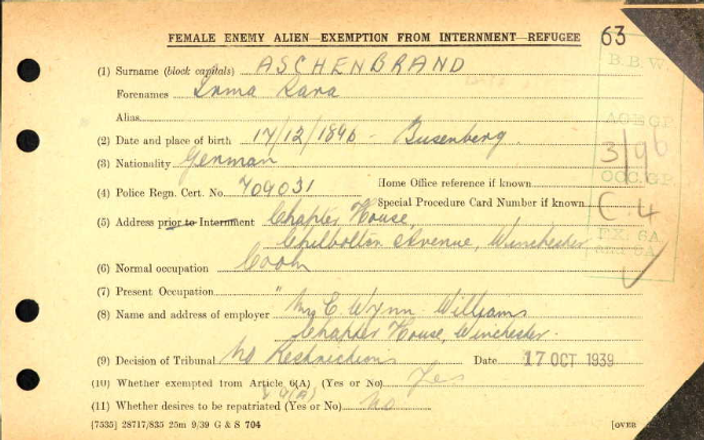
IRMA RARA ASCHENBRAND
'Female Enemy Alien'
Irma Rara Aschenbrand was a German Jew born in Busenberg, Germany in 1874. In 1939 she was a domestic servant working for the Wynn-Williams at Chapter House.
Busenberg is a municipality in Südwestpfalz district, in Rhineland-Palatinate, western Germany. Busenburg had a small Jewish community since the early 19th century, with a cemetery and a synagogue. The Jewish population of the town in 1867 was 129, just over 16% of the population, working as junk dealers and small-scale livestock traders. The Jewish population declined to 74 in 1875, 50 in 1900 and 28 in 1932.
With Hitler's appointment as Chancellor of Germany in 1933, the anti-Jewish sentiment in Germany rapidly increased. The 1935 Nuremberg Laws stripped German Jews of their citizenship and prohibited Jews from marrying non-Jewish Germans. These laws resulted in the exclusion and alienation of Jews from German social and political life. By 1938, the last Jews in Busenburg had left the town.
One of the British government's responses to this situation in Germany was the introduction of a visa programme to allow German Jews to take up employment as domestic workers in Britain. Domestic work was an area in which Britain was experiencing a shortage of workers in the 1930's. In 1939 the conditions under which a refugee would receive a domestic permit were formulated. Among them were a medical certificate, the women had to be single, divorced or widowed and between 18 and 45, married women were only accepted if the husband was already in the UK and married couples were allowed entry only if both were employed in domestic services – single men were excluded. The work undertaken had to be in a private household and the minimum wage had to be paid.
In 1939, Irma Aschenbrand was working as a domestic servant for the Wynn Williams at Chapter House, Chilbolton Avenue. It is likely, but not proven, that Irma arrived at her position through the Domestic Permit programme.
With the start of the Second World War, there was a growing mood of anti-German and also anti-Jewish sentiment in Britain. By September 1939, there were over 20,000 German and Austrian refugee women employed as domestic servants in Britain. On the immediate outbreak of the war, around 8,000 Jewish domestics were sacked.
Since 1914, all aliens over the age of 16 had needed to register their details at local police offices. Upon the declaration of war on 3 September 1939, some 70,000 UK resident Germans and Austrians became classed as enemy aliens. The Aliens Department of the Home Office set up internment tribunals throughout the country headed by government officials and local representatives, to examine every UK registered enemy alien and determine whether they should be interred.
The vast majority of enemy aliens were declared exempt from internment, including most of the Jewish domestic refugees. Irma was one of those 'Female Enemy Aliens' who were found to be exempt from internment. Under 'Reasons for Decision' is written 'Appears to be a genuine refugee'.
It is not known how long Irma stayed working for the Wynn Williams. By autumn 1939, the government lifted the restriction on alien domestic workers, allowing them to work in any occupation.
Irma went to the United States in 1947, on the Batory. On the list of passengers she gave her address as Brondesbury Road, London NW6, and citizenship as 'stateless'. She applied to be a US citizen.
US Social Security records show her as dying in 1974, 'in Europe'.
Outstanding questions:
No birth record has been found. Was Aschenbrand her married name? Was she a widow when she came to Britain?
There are two other Aschenbrand's on the Female Enemy Alien register - Else Rana, born 1893 in Essmeiler, living in Hampshire, and Fanny born 1901 in Frankfurt, living in London. (Busenburg, Essmeiler and Frankfurt are within 100 miles of each other). What is the relationship?
There is a family of Aschenbrand's living in New York in 1930/40's. Was there a connection?
Where did she die?
Sources:
The Encyclopedia of Jewish Life Before and During the Holocaust, editor Schumel Spector.
Thesis: A question which Affects our Prestige as a nation - The History of British Civilian Internment, 1899-1945; Zoe Andrea Denness.
National Archives - Collar the lot! Britain’s policy of internment during the Second World War https://blog.nationalarchives.gov.uk/collar-lot-britains-policy-internment-second-world-war/